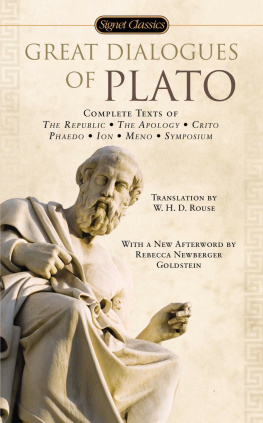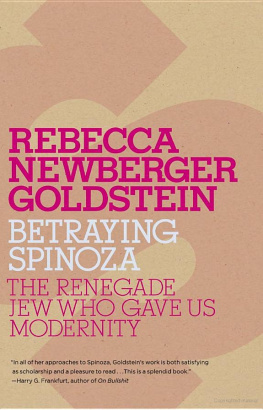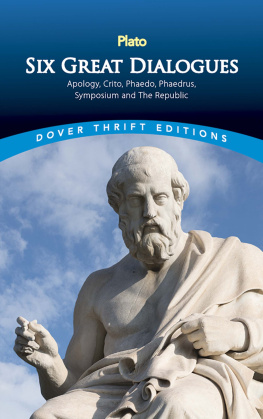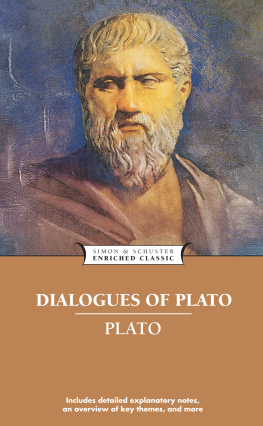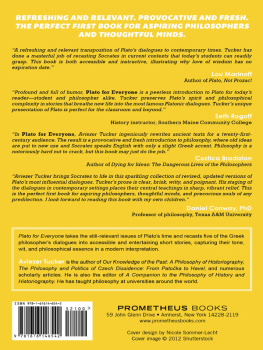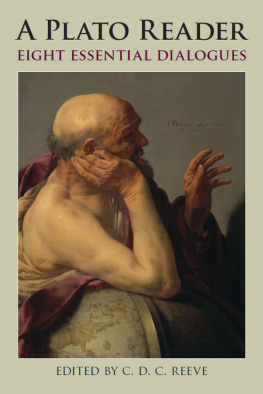Goldstein Rebecca - Great Dialogues of Plato
Here you can read online Goldstein Rebecca - Great Dialogues of Plato full text of the book (entire story) in english for free. Download pdf and epub, get meaning, cover and reviews about this ebook. City: New York, year: 2015, publisher: Penguin Publishing Group;Signet Classics, genre: Religion. Description of the work, (preface) as well as reviews are available. Best literature library LitArk.com created for fans of good reading and offers a wide selection of genres:
Romance novel
Science fiction
Adventure
Detective
Science
History
Home and family
Prose
Art
Politics
Computer
Non-fiction
Religion
Business
Children
Humor
Choose a favorite category and find really read worthwhile books. Enjoy immersion in the world of imagination, feel the emotions of the characters or learn something new for yourself, make an fascinating discovery.
- Book:Great Dialogues of Plato
- Author:
- Publisher:Penguin Publishing Group;Signet Classics
- Genre:
- Year:2015
- City:New York
- Rating:5 / 5
- Favourites:Add to favourites
- Your mark:
- 100
- 1
- 2
- 3
- 4
- 5
Great Dialogues of Plato: summary, description and annotation
We offer to read an annotation, description, summary or preface (depends on what the author of the book "Great Dialogues of Plato" wrote himself). If you haven't found the necessary information about the book — write in the comments, we will try to find it.
Great Dialogues of Plato — read online for free the complete book (whole text) full work
Below is the text of the book, divided by pages. System saving the place of the last page read, allows you to conveniently read the book "Great Dialogues of Plato" online for free, without having to search again every time where you left off. Put a bookmark, and you can go to the page where you finished reading at any time.
Font size:
Interval:
Bookmark:
A volume which merits a place on even the smallest bookshelf.New York Herald Tribune
In the golden days of Greek civilization, four hundred years before the birth of Christ, the philosopher Plato wrote the Dialogues, which, to this day, comprise the most influential body of philosophy of the Western world. Written in the form of debates, the Dialogues are filled with philosophys continual search for truth and the moving drama of intellectual conflict.
The Republic, a brilliant discussion of the ideal state, presents Platos basic concepts of education, justice, and the philosopher-king, the wise and just prototype of a ruler who could cure the worlds ills. In the dialogues Apology, Crito, and Phaedo, the imposing figure of Socrates, Platos beloved mentor, emerges to discuss respect for law and authority, human virtue, and the immortality of the soul. The additional dialogues contain the great philosophers thinking on subjects of such universal and ageless interest as art, virtue, and the nature of love and beauty.
W. H. D. Rouse, one of the worlds greatest classical scholars, made world-famous translations of Homers The Odyssey and The Iliad. Dr. Rouse was educated at Cambridge University, where he became an Honorary Fellow of Christs College.
Matthew S. Santirocco is Professor of Classics and Dean of the College of Arts and Science at New York University. He has written on Greek and Roman literature and edits the journal Classical World.
Rebecca NewbergerGoldstein is the author of such novels as The Mind-Body Problem; Properties of Light: A Novel of Love, Betrayal, and Quantum Physics; and 36 Arguments for the Existence of God: A Work of Fiction; as well as acclaimed nonfiction including Betraying Spinoza: The Renegade Jew Who Gave Us Modernity and Plato at the Googleplex: Why Philosophy Wont Go Away. Among her many honors and awards are a Guggenheim Fellowship, a MacArthur Fellowship, and grants from the National Science Foundation and the American Council of Learned Societies. She was named Humanist of the Year by the American Humanist Association and elected to the American Academy of Arts and Sciences. She is currently Visiting Professor of Philosophy, New College of the Humanities, London.

SIGNET CLASSICS
Published by the Penguin Group
Penguin Group (USA) LLC, 375 Hudson Street,
New York, New York 10014

USA | Canada | UK | Ireland | Australia | New Zealand | India | South Africa | China
penguin.com
A Penguin Random House Company
Published by Signet Classics, an imprint of New American Library, a division of Penguin Group (USA) LLC. Previously published in a Mentor edition.
First Signet Classics Printing, October 1999
First Signet Classics Printing (Newberger Goldstein Afterword), January 2015
Copyright John Cline Graves Rouse, 1956, 1984
Introduction copyright Matthew S. Santirocco, 2008
Afterword copyright Rebecca Newberger Goldstein, 2015
Penguin supports copyright. Copyright fuels creativity, encourages diverse voices, promotes free speech, and creates a vibrant culture. Thank you for buying an authorized edition of this book and for complying with copyright laws by not reproducing, scanning, or distributing any part of it in any form without permission. You are supporting writers and allowing Penguin to continue to publish books for every reader.
 REGISTERED TRADEMARKMARCA REGISTRADA
REGISTERED TRADEMARKMARCA REGISTRADA
ISBN: 978-1-101-21298-1
If you purchased this book without a cover you should be aware that this book is stolen property. It was reported as unsold and destroyed to the publisher and neither the author nor the publisher has received any payment for this stripped book.
Version_2
Afterword
Plato belongs to the ages, and yet Ive always felt that he also belongs to me. I first encountered him when I was thirteen, and my reaction was intenseso intense it determined the trajectory of my life.
I was an unlikely candidate to have such a reaction and such a trajectory. I grew up in a strict religious household, the kind that didnt encourage worldly intellectual ambitions, especially not in its daughters. Modesty was the virtue most preached to me and my sistersa modesty that expressed itself not only in outward dress and demeanor but also in attitudes that penetrated deep into the psyche. Our modesty stifled questions before they even got themselves formed. Ponderings that might have led to interesting places were halted in their tracks by the internalized modesty patrol, admonishing, Just who do you think you are to question X? or So what if Y doesnt make sense to you? Far smarter people than you have seen fit to believe Y.
My own circumstances may strike you as parochial and peculiar; but then all of our circumstances are, in one way or another, parochial and peculiaror in any case, they begin that way. Plato tells us precisely this at the very start of the most famous passage in all of Western philosophy, the Republics Myth of the Cave. Socrates sets the scene, describing men sitting shackled in the back of a cave, their heads chained so that their field of vision is confined to one dimly lit wall across which shadows are flitting, cast by puppets held up on sticks carried by men who scurry back and forth behind a wall. A fire burns at their backs, providing the light source for the shadow show that constitutes the entire world for the prisoners. Its a strange image youre describing, and strange prisoners, remarks Socrates interlocutor, Glaucon, and Socrates responds, Theyre like us (515a). There is an immensity contained in the simplicity of Socrates assertion. Theyre like us. So yes, though we might inhabit peculiarities particular to our personal circumstances, there is also something universal about our predicament. Plato would not have known, of course, of my own peculiar circumstances, but he nevertheless knew that I was a prisoner of them.
I dont exactly remember how I got my hands on The Story of Philosophy by Will Durant. It must have been borrowed from the White Plains Public Library, which I visited religiously every Friday afternoon in order to get the books I would read over the Sabbath. I barely knew what philosophy was about, just that, in my own dimly lit world, it was considered full of dangerous ideas.
Why then did I, a demure and well-behaved child, decide to take home The Story of Philosophy? Its not that I doubted that some ideas are dangerous. My familys history in Nazi Europe had made me aware from an early age that there are ideas that lead to unimaginable horrors. My very name, Rebecca, bore the memory of a relative who had died in a cattle car on her way to a mass-killing facility. But something had begun to bother me about how ideas had been chosen for me, with all competitors removed from consideration. If these chosen ideas were so obviously superior, then why must I be kept away from anything that challenged them? If these chosen ideas were going to crumble on exposure to probing, then maybe they werent as superior as promised. Shouldnt ideas be allowed to slug it out among themselves? Wouldnt that be the best way to expose the danger that lurked in some of them? How could I even assess whether the ideas that others had chosen for me might not also have something dangerous lurking inside them unless I learned for myself how to think about ideas?
Next pageFont size:
Interval:
Bookmark:
Similar books «Great Dialogues of Plato»
Look at similar books to Great Dialogues of Plato. We have selected literature similar in name and meaning in the hope of providing readers with more options to find new, interesting, not yet read works.
Discussion, reviews of the book Great Dialogues of Plato and just readers' own opinions. Leave your comments, write what you think about the work, its meaning or the main characters. Specify what exactly you liked and what you didn't like, and why you think so.

